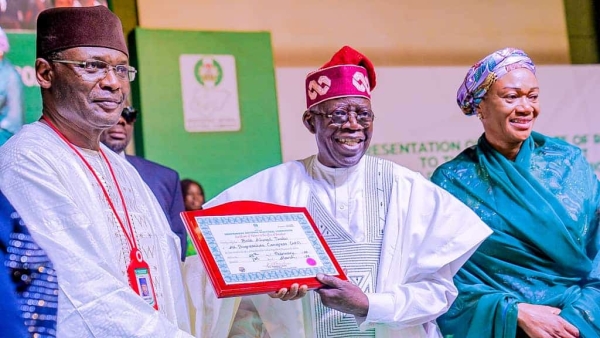Ahead of the 2027 general elections, the Independent National Electoral Commission (INEC) is proposing major amendments to Nigeria’s electoral framework, including stripping the President of the power to appoint Resident Electoral Commissioners (RECs).
Instead, INEC is seeking constitutional changes that would grant the Commission the authority to appoint and discipline heads of its state offices, to be known as State Directors of Elections.
The proposals were disclosed by Mohammad Kuna, Special Adviser to the INEC Chairman, during a retreat with the Joint Committee of the National Assembly on Electoral Matters held in Lagos on Monday.
INEC is pushing for amendments to:
- Section 14 (3) Paragraph F of the Third Schedule of the 1999 Constitution to empower the Commission to appoint and discipline Heads of State and FCT Offices;
- Section 6 (3) of the Electoral Act 2022 to align the Electoral Act with this new arrangement.
Currently, the President appoints RECs under Section 154 (1) of the Constitution, subject to Senate confirmation, with removal only possible by presidential action supported by a two-thirds majority of the Senate.
“Critical for Transparency and Accountability” — INEC
Kuna said the changes were necessary to promote transparency, accountability, and efficiency in electoral administration, especially in light of controversies surrounding the conduct of the 2023 general elections.
The heads of INEC offices at state level, now proposed to be called State Directors of Elections, would be fully accountable to the Commission rather than to political interests.
INEC Proposes Electronic Voter Cards
INEC is also seeking to amend Sections 47 (1) and 16 (1, 2 & 4) of the Electoral Act to allow the introduction of electronically downloadable voter cards to replace the traditional Permanent Voter Cards (PVCs).
The move is aimed at modernising voter identification and reducing logistical challenges associated with PVCs.
Push for Early, Special, Diaspora, and Inmate Voting
Another key proposal is the amendment of Sections 77 (2), 117 (1), 132 (5), and 178 (5) of the Constitution to allow:
- Early voting for election officials and essential workers;
- Special voting for Nigerians under incarceration;
- Diaspora and out-of-country voting for eligible Nigerians living abroad.
INEC said these reforms are essential to broaden electoral participation and protect the voting rights of under-represented groups.
INEC also proposed constitutional amendments to create:
- An Electoral Offences Commission to handle electoral violations;
- A Political Party Regulatory Agency to oversee party activities and ensure compliance with electoral laws.
These would be achieved by amending Sections 153 (1), 154 (3), 156 (1a), 157 (2), 158 (1) and 160 (1) and the Third Schedule of the Constitution.
Affirmative Action for Women and Persons with Disabilities
The Commission is proposing special seats for women and Persons with Disabilities (PwDs) by amending Sections 48, 49, 71, and 91 of the Constitution to create designated constituencies for these groups.
“While the Commission should continue to work with political parties for greater participation of under-represented groups, the surest way to achieve that objective is through affirmative action backed by law,” the document stated.
INEC also called for a clean-up of ambiguities and cross-referencing errors in the Electoral Act 2022, including:
- Clarifying the difference between “transfer” and “direct transmission” of results (Sections 60 and 64);
- Correcting incorrect cross-references between Sections 64 (4a & 5) and Section 47 (2);
- Cleaning up inconsistencies in Sections 29 (1), 75 (3 & 4), 77 (3), 131 (5 & 6), and 132 (5–10).
Additionally, INEC proposed amending Section 65 (1) to specify that election results can only be reviewed if declared under duress.


